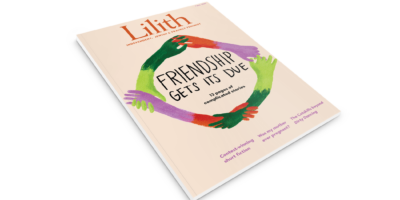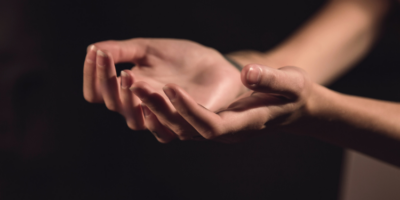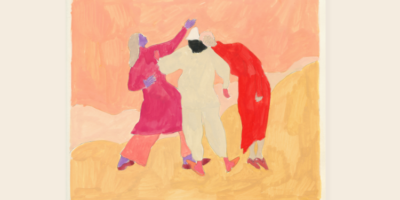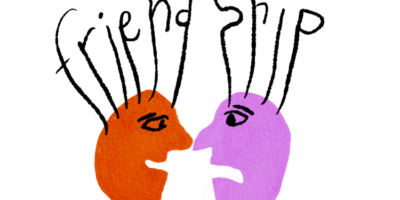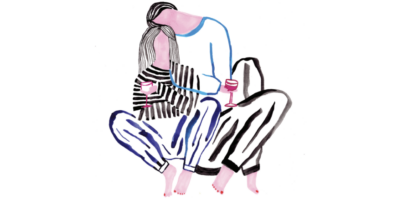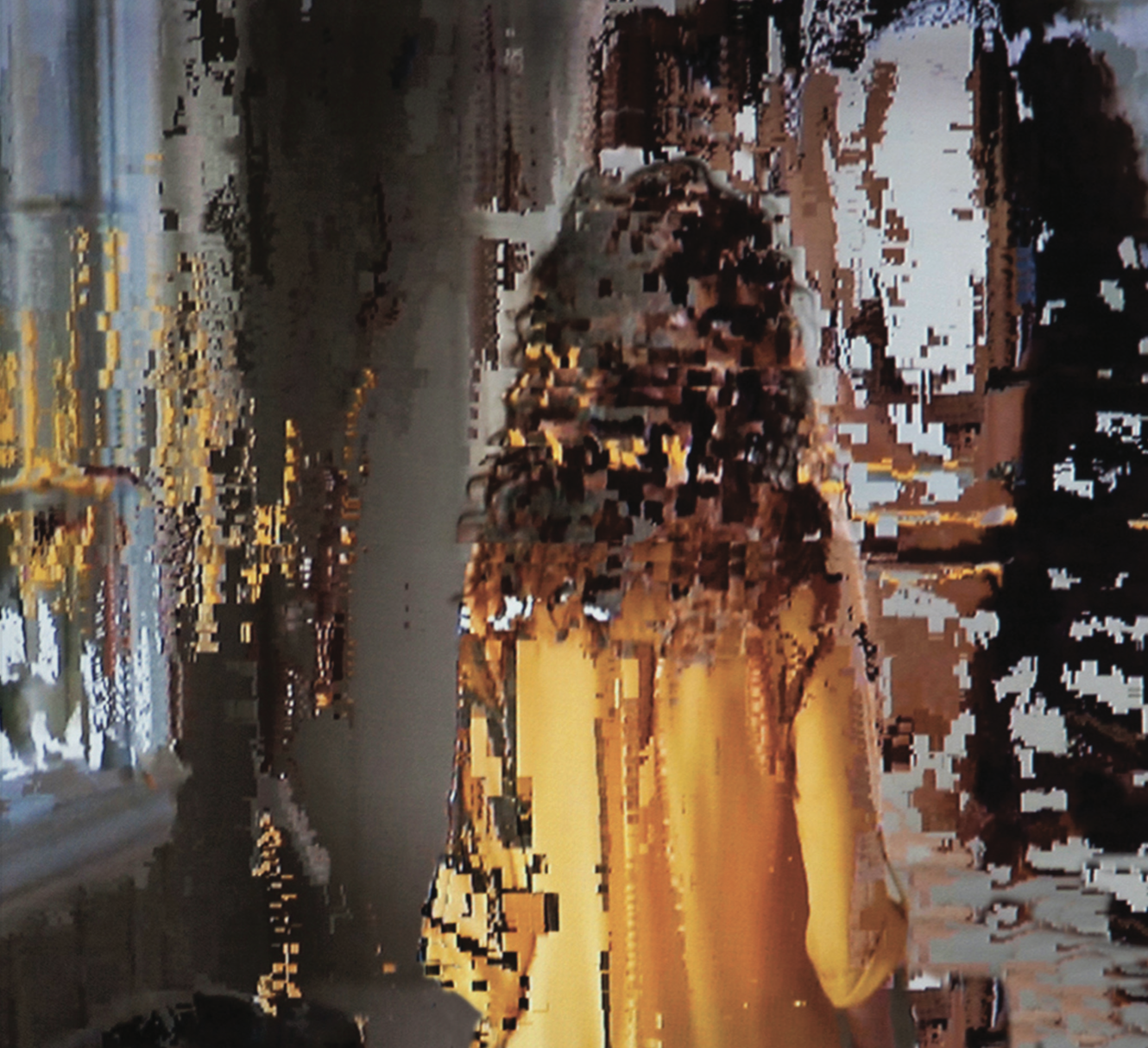
ART: “GIRL IN YELLOW DRESS,” BY SHERRY KARVER SHERRYKARVER.COM, INSTA @SHERRYKARVER.
Fiction: Autumn Chill
It’s not yet ten and Sarah feels the hunger coiling tightly in her stomach. It foreshadows a long day, counting the degrees of sunset. Next to her in the car, her brother picks at a scab on his elbow. He makes a grunt of satisfaction as he parts the shell from his skin, only to wince as a sudden well of blood takes its place. She smacks gently at his hand.
“Stop that.”
“I can’t help it,” he says, smearing the blood around with his thumb.
“Sarah.” Her mother says from the front seat “Can you help him please?” She does so without turning around, as if she can smell injury in the air. Sarah grabs his elbow and the Band-Aids her parents keep in the car. She pulls one out, Gary the Snail.
He scowls. “I want Sponge Bob.” She takes out another, this one with the correct yellow squares, and cleans off the skin with a wet wipe. Ori is a mosaic of scrapes and bruises, excessive even for a boy his age. Sometimes Sarah thinks that he moves a half-step behind the turn of the earth, tumbling and wheeling against a momentum he can never match.
“If you keep picking, it’s not going to heal,” she says, fastening the Band-Aid to his elbow.
The car pulls into the parking lot of the synagogue and Sarah focuses her attention on a small run in her stockings and away from the congregants moving steadily indoors. Women with strings of pearls and men in suits. There are kids from the Jewish Day School, where she is a junior, mingling by the browning hydrangeas. All around them are so many children, sticky-faced and running, scuff marks already on their nice clothes.
“Come on,” her mother says once they park. She pulls Ori out of the car by his armpits. He is tall and gangly, and his heels drag against the asphalt. He’s only four years younger than Sarah but inspires the treatment of someone much smaller. Ori’s thumb is pink with blood, and when their mother turns away, he wipes it on the back of her blouse. Sarah stands, dusting crumbs and lint off her dress. It is a favorite of hers, blue cotton sprinkled with little white flowers, but over the summer it grew taut around her breasts and belly, and now she regrets wearing it.
They weave through the congregants out front, polite hellos and L’Shana Tovas. Inside, they sit in the back so her parents can quickly remove Ori if need be. The mood is more somber than it had been a week ago at Rosh Hashanah; hunger dampens the noise, subdues the crowd. There is a unity in this shared discomfort. It is Sarah’s first year fasting, and the feeling of it is still as novel as it is unpleasant. There is something distinctly adult about a group of people sitting together, sharing a low-frequency pain.
In past years, Sarah had spent Yom Kippur splitting a bag of Cheerios with Ori. She would apologize silently for small failures; wailing when he tore out a clump of her hair, throwing the plastic head of a doll at him when she found it severed from its body. This year however, she has nothing to offer on the altar of guilt, just a faceless grief that cannot be sealed off with cotton and adhesive. Across the chapel, she spots a head of sandy, curly hair turning around to wave at the last of the teenagers coming inside. Davie she knew he would be here, but still her stomach seizes. She looks at her legs, feels an overwhelming urge to tearat the track in her tights. She sticks her hands under her thighs.
Last spring, she and Davie had kissed in the back of the school library. They had not been boyfriend and girlfriend, just two children who made regular eye contact in Mrs. Rosenthal’s history class. He was boisterous and always getting reprimanded, popular in an immature kind of way. She had known Davie since daycare, and in the past had thought him stupid and annoying. But puberty was molding him into someone who would one day be handsome. And although he did not seem to know it yet, Sarah did.
The library was quiet. There were no screaming brothers in the library. Sometimes, she didn’t even read, she would just sit at a table and watch the light change. She would imagine someone walking in and noticing her. They would admire the way the sun caught the hidden gold of her hair; they would wonder who she was and what she was thinking about. Nobody ever did. It was Sarah who found Davie, hunched over a book in the furthest row from the entrance. He was mouthing the words silently, his forehead creased with focus. She watched him for a moment, and then whispered.
“What are you reading?”
He looked up in surprise. She could see his face flush with shame. He shut the book. “Nothing.” Sarah glanced at the cover, To Kill A Mockingbird.
“Wasn’t Harper Lee last year?” she asked.
Davie looked at the ground, his shoulders sagged, “I had to re-take English,” he mumbled. Something about this gesture endeared him to her.
“I mean…It’s not that good. You’re not missing much.” He laughed a little at that. Encouraged, she sat down next to him.
“I’m shit at reading,” he said. “I basically faked my way through my bar mitzvah.”
“I’m shit at math,” she offered.
“It’s not the same. Everyone is shit at math.” He was looking at his shoelaces when suddenly he grabbed her wrist. “Please don’t tell anyone okay?” His eyes were panicked, his hand clammy and soft.
“I won’t,” she whispered. Sarah could see her reflection in his eyes. The sun was slow and murky through the dirty windows. It made her feel as if she was underwater, like the world was being filtered through something before it reached her. The air smelled of old paper, disinfectant, and Davie’s sweat. She realized their legs were touching. A gulf seemed to open between herself and her actions, wide and wonderful. She kissed him, tentatively, the books settling around them as the school emptied out. His mouth went slack in surprise, but quickly became persistent; little thrills cut up her spine until she felt a restlessness build inside of her, an orchestra of pressure. She grabbed his wrist and brought his hand up underneath her shirt. He let out a soft groan into her mouth, and Sarah nearly gasped in recognition. She felt known to him in a way nobody had ever known her.
Now, he does not see her. At school, they give one another a wide berth, retreating into the comfort of their separate friends. This is a small mercy; Sarah thinks that if she has to look him in the eye again, she will scream. Up on the bimah, Rabbi Alderman steps out, the strings at the end of his tallit swinging
as he walks to the podium.
Sarah moves through the Yom Kippur service with the familiarity of someone whose entire education is received through the thin gauze of religion. There is the Byzantine Empire, and the Shema, the Mitochondria, and the V’ahavta. Ever since the summer, everything has changed for her. Her life feels raw, a torn scab. But the prayers are a constant; centuries of hungry Jews saying the same words over and over again, asking for another, better year.
A week after they kissed, Davie caught her after classes. She had planned to spend another afternoon in the library, instead, she went home with him. Sarah and Davie watched TV on the couch in his basement. Watching became kissing, which became sex. It was awkward and strange, but also kind of wonderful. Afterward, staring at the wood paneled ceiling with him, neither had spoken. Sarah could hear his breathing slow. She curled her fingers through his, and he smiled at her. Two green marbles, with the shape of a girl inside. They had done it once more in the last month of school, and then never again. Now, Sarah thinks of the basement’s quiet, of Davie’s warm body next to hers, and the hole in her stomach whines.
By early July, Sarah had grown bloated and lethargic. Her still-new breasts ached when she put on a bra in the morning. She noticed when in the month her mother grew crabby, and waited for her body to align, as it always had before. The blood never came, and she used her allowance money to buy a pregnancy test at CVS. She ran across the street to the pet store which had a public bathroom. She sat against the cold tile in slow shock.
On the Bima, the arc has been opened, the room solemn and still. The Torah glows like a swaddled baby. Rabbi Alderman moves into the Amidah. As a child, this part of the service always fascinated Sarah. She imagined God listing who will live and who will die in the coming year. Every existing person filing small and orderly under His god-sized pen. She wonders, what did God write for the not-baby she and Davie made? Did He add its name to both columns, life and death?
It is strange now, to admit that she had not thought of the risks. But in truth, she hadn’t. When Sarah had shown the pregnancy test to her mother, she had looked at the stick of plastic with a sickening combination of shock and guilt. It was the look of someone who had left on a burner and found the kitchen filled with smoke. It was the look of someone who had forgotten something terribly important. Perversely, Sarah had felt almost smug. She could not remember the last time either of her parents had treated her with concern.
“Why?” her mother had whispered, “Just, why?”
She could not reply. The best she could offer to herself, is that she had wanted something, and reached for it. Sarah, who had sacrificed a red velvet birthday cake for vanilla because it was Ori’s preference, who had handed over endless toys for fear of tantrum, who had said nothing when her parents missed recitals and soccer games for meetings with Ori’s behavioral therapist. Sarah had wanted and wanted not to think beyond the want.
Nobody ever asks Ori why he scratches and bites, why he cannot tie his shoes, why he wails at lightning and fireworks. And although Sarah knows that is different, some bitter part of herself refuses to believe that it is. Ori wants everything, and he gets it, even things he does not actually want, or things he has not had time to want before they are given to him. Ori’s life is an overfull bowl of want, one she and her parents all balance delicately for fear of spilling. Sarah wanted once, more than wanted, hungered. Just one single thing and look what became of it.
The congregation begins to chant. When Rabbi Alderman says, Kadosh, Kadosh, Kadosh, holy, holy, holy, Sarah’s heels rise up of their own accord. For a second, she feels seamlessly merged with the larger movements of the congregation, freed from the problems of her individuality. For a second, she feels almost full. On the third Kadosh, her stomach lets out a loud growl. Ori looks up at her and blows a raspberry, spittle flying onto the people seated next to him. The row in front of them turns around. Her mother strokes his hair. Her father shushes them both, as if they have committed equal crimes. Sarah is hungry and hot; despair pushes out from a million unstoppable angles. She mouths the word “bathroom” to her mother, who instinctively looks to Ori. Sarah leaves her seat before she can be asked to take him with her.
In the parking lot, the air has cooled. The first fall leaves skitter against the sidewalk. Soon, there will be pumpkins, greedy fingers tearing at candy wrappers, the kind of nights that shiver with promise. All this seems lost to her now. Sarah bends over, her stomach is an angry animal, clawing its way up and out through her chest. She can’t breathe, she can’t think, she is going to die here, in the stupid fucking synagogue parking lot. She hears a noise and looks up. Davie stares back at her.
“The Torah glows like a swaddled baby.”
He is sitting cross-legged on the sidewalk, his dress pants a size too small, revealing bare ankles. He is eating naked Cheerios out of his pocket and looking at her. The thought of him seeing her like this, hunched and ragged, forces her to calm herself. She takes slow, deep breaths, relaxes her muscles the way her parents tell Ori to when his rage and sadness exceed the limits of his body.
The doctor’s office had confirmed it, and on the car ride home, her mother asked two questions. “What do you want to do?” and “Do you want to tell him?” It was the second that made her pause. The first had not required thought. She knew—the same way she knew the prayers or when to stand and sit in services—that she did not want to have this child. But the second was somehow harder. Sarah had both known Davie all her life, and yet also barely knew him at all. She knew he had to repeat sophomore English. She knew that in third grade he had gone through a phase in which he carried around prank gum, the kind that shocked you when you pulled at it. She knew that his favorite cookies were snickerdoodles because he had kicked over a chair when he lost a chance to win them at the Purim Carnival a few years back. But she did not know who he was, what hopes and aspirations he had,what was owed to him, in this thing they had done together. She had sighed, stared at her shoes, felt the tug of a responsibility far outside her own desires. “I guess we should tell him, right?”
Davie is standing now, nervously popping Cheerios into his mouth. “Do you want some?” he asks, holding out a handful. “I know it’s not allowed but…” Sarah desperately wants some, but she shakes her head. He nods and shifts his weight from one leg to the other. “Did you have a good summer?” She looks at him, her face twisting into hurt. “I’m sorry, that’s a stupid question. I know we haven’t talked, since, well…”
Sarah does not want to think about the terrible afternoon she and her mother spent at Davie’s house. She does not want to think about the itchy upholstery on their couch, or the way his parents looked at her as if she was sick and contagious. She does not want to be reminded of the way she and Davie avoided eye contact while the adults talked through the situation, their nodding heads and even countenances. Everything after is twisted and sideways. The nurses who spoke slowly and softly, the cold shock of metal, the hollow cramp.
In the months that followed, Sarah’s family slid back into their routines. Her father left early for work; her mother took Ori to his summer camp for special kids; Ori himself had a growth spurt and the air around him grew thin from all he consumed. For a little while, her parents would give her sidelong glances, peeking through doorways when they thought she wasn’t looking. But these dwindled, and eventually stopped. Everything had gone back to the way it was, except for her.
Sarah is not guilty, at least not for something as physical as what grew inside of her. She is just sad, and so, so hungry. Hungry to be seen, hungry to be wanted, hungry for a childhood she cannot find her way back to. She stands there, in front of him. In her blue dress with the white flowers, tight in all the
places it never was before.
“My summer sucked,” Davie says, as if it is a kind of consolation. “My parents grounded me because of what happened.”
“What?” she asks, incredulous.
“They wouldn’t let me go on vacation or anything,” he says.
This summer, she got an abortion, and Davie got grounded. The thought is so ridiculous, Sarah cannot help but laugh. She laughs until tears break free from her eyes, until her chest catches, until the laughter seems to expand like a balloon pushing out all the hunger and confusion and hurt of the past three months. She is wheezing so hard that she is forced to sit, and he sits too, looking bewildered. She laughs and laughs until finally, she catches her breath.
“Sorry,” she says, wiping tears from her eyes.
“It’s okay,” he replies, and Sarah is reminded of Davie’s earnestness. How, when he would mock teachers and get in trouble, he would look back at the classroom with a desperate smile, just another kid jockeying for attention, taking whatever could be clawed and claimed. “I’m sorry, for avoiding you, for everything.” And he seems as if he truly is.
“I was avoiding you too,” she says.
“Was it…bad?” he asks.
“Not bad.”
“Are you glad that you, you know, did it?”
“Yeah, I am,” she says without hesitation. Davie nods, he crunches his Cheerios. “I’m glad too,” he says. He looks relieved, and within the relief, is the shadow of a terror Sarah recognizes. In the place of the desire she once felt for him is a distant pity. After all, he cannot help who he is. The same way Sarah cannot help who she no longer is.
She closes her eyes. She feels spent, a sweet exhaustion moving slow and syrupy through her body. She tilts her face towards the sun. It is day now, but beyond it is the promise of sunset. The breeze blows back her hair and she can smell the slight chill, the crisp undercurrent of fall, the leaves changing on their branches.
Nesha Ruther has had work published in NarrativeNortheast, Angles Literary Magazine, Beltway Quarterly and more. She was a 2022 participant in Tin House’s Winter Writing Workshop and now works as the Lead Writer for the publishing company and art house, Bond & Grace.

